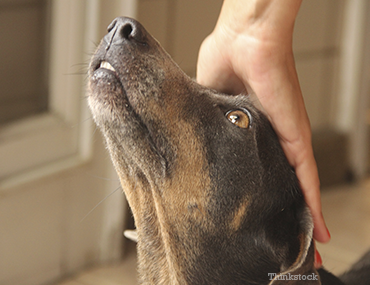What is a mast cell tumor?
Mast cells are a type of cell found throughout the body but particularly in the skin, subcutaneous tissue, liver, lungs, and digestive tract. Mast cells normally play a role in the body’s response to inflammation and allergens. A mast cell tumor (MCT) is a cancer that arises from mast cells. The most common site for mast cell tumors in dogs is the skin.
Who is affected by mast cell tumors?
Mast cell tumors are a very common cutaneous tumor found in dogs. Mast cell tumors are relatively uncommon in cats and are very rare in humans. They typically occur in older dogs but can be identified in dogs as young as 3 months of age. Male and female dogs are affected equally. Certain breeds of dogs like Boxers, Boston Terriers, Bulldogs, Pit Bull Terriers, Weimaraners, and Rhodesian Ridgebacks are more likely to develop mast cell tumors.
What are the signs and symptoms of mast cell tumors?

Unfortunately, mast cell tumors do not have a characteristic form. Their appearance can vary greatly and they can be big, small, firm, soft, raised, flat, covered with hair or ulcerated. They can be found anywhere on the skin’s surface: on a leg, the chest, head, or abdomen. An interesting feature of mast cell tumors is how they can quickly fluctuate in size. Mast cell tumors can suddenly get smaller and then abruptly enlarge. If you notice a new lump, bump, or ulcerated lesion on your pet have your veterinarian examine him as soon as possible.
How do you know if your pet has a mast cell tumor?
Since mast cell tumors do not have a characteristic appearance or texture the only way to accurately diagnose a mast cell tumor is by sampling the tumor. Because benign and cancerous skin lumps can appear similar, Dr. Brenda Phillips and Andi Flory, San Diego veterinary oncologists, recommend that skin lumps be sampled with a needle (aspiration) and cells examined under a microscope (cytology) to determine their significance. This procedure is easy, quick and well tolerated by most pets. It is typically done without sedation. This is often the first step in diagnosing any tumor, because it is so quick and easy. Once your veterinarian knows if a lump is cancerous they can recommend an appropriate treatment.
What is the treatment for a mast cell tumor?
Since cutaneous mast cell tumors are locally invasive and can also metastasize or spread to other parts of the body, treatment involves wide surgical removal of the lesion and surrounding tissue. All tissue removed should be sent to a lab for pathology analysis to ensure that the tumor was removed completely and also to determine grade. Depending on the reported margins and grade (microscopic appearance of the tumor) further therapy involving additional surgery, chemotherapy, and radiation therapy may also be recommended.
Prognosis of a mast cell tumor
If your pet has a mast cell tumor what does this ultimately mean? The overall prognosis for mast cell tumors depends on the location, size of the lesion, surgical margins, whether it has spread (metastasized) and the grade of the tumor. Your veterinarian or a veterinary oncologist will be able to give you a better idea of your dog’s prognosis based on these factors. As with many other diseases early detection and removal of mast cell tumors increases the likelihood of successful treatment and outcome
It is important to realize that cancer is an unfortunate reality for many of our older pets. Today, veterinary oncology is highly advanced and there are many things pet owners can do to treat or even cure their pet of cancer. The key to fighting cancer is simple – early detection, diagnosis, and action! Monitor any old, existing lumps for change and notify your veterinarian if you find any new lumps.
**EVENT NOTICE
Join a Canine Cancer Walk in your area to help the Morris Animal Foundation support cancer research. For information about these worthy and fun walks go to --
http://www.morrisanimalfoundation.org/ways-to-donate/events/)
If you have any questions or concerns, you should always visit or call your veterinarian -- they are your best resource to ensure the health and well-being of your pets.
